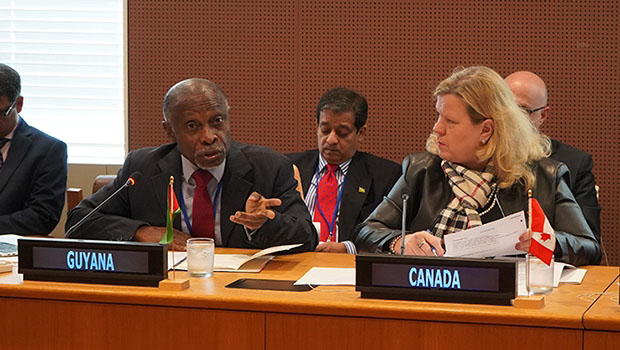Guyana has requested that the United Nations Secretary General place this country’s border controversy with Venezuela on the Agenda of the General Assembly under the Item “Peace Building and Sustaining Peace” and that it also be brought to the attention of the Security Council.
This is according to a statement yesterday from the Commonwealth Ministerial Group on Guyana which expressed its continued support for the pursuit of a judicial course of action as the means through which the border controversy can be permanently resolved.
The statement was issued after a meeting held yesterday at the United Nations General Assembly in New York.
The Group welcomed the update that the Inter-national Court of Justice (ICJ) has notified Guyana that hearings on the jurisdiction of the Court will be held in The Hague, The Netherlands, from 23-27 March 2020.
It was noted that Foreign Secretary Carl Greenidge delivered a briefing during which he advised that Venezuela continues to assert that the ICJ has no jurisdiction in the matter, notwithstanding the Geneva Agreement and the United Nations Secretary General’s choice of it, as a means of conclusive settlement.
The statement added that Greenidge also briefed the Group of reported developments of concern to Guyana in the maritime area of controversy; and Guyana’s request for it to be added to the Agenda of the Assembly.
The Group reiterated its unequivocal support for the maintenance of the sovereignty and territorial integrity of Guyana and its unimpeded right to the development of the entirety of its territory for the benefit of its people and reminded that at the most recent Commonwealth Heads of Government Meeting, in London in April 2018, leaders expressed full support for the decision by the Secretary General to choose the ICJ as the means for the settlement of the controversy.
“Heads noted that the decision of the Secretary General, which was in accordance with the principles and purposes of the United Nations Charter, was intended to bring a peaceful and definitive settlement to a longstanding controversy. Heads reiterated their unequivocal support for the maintenance and safeguarding of Guyana’s sovereignty and territorial integrity,” the statement concluded.
In accordance with a mandate given by the Commonwealth Heads of Government in 1999 to monitor “further developments in respect of the existing controversy between Guyana and Venezuela” the group established includes Antigua and Barbuda, Bangladesh, Canada, Guyana, Jamaica, South Africa, and the United Kingdom. Yester-day’s meeting was chaired by Bangladesh.
The Commonwealth meeting underlines the importance of the institution to Guyana at a point when questions have been raised about the unconstitutionality of the present APNU+AFC government. On Monday, Common-wealth Secretary-General Patricia Scotland declared that Guyana was in breach of its constitution by not holding general elections by September 18.
She urged “all relevant stakeholders and institutions” to restore constitutional rule in Guyana by immediately setting an early election date in consonance with its constitution, enabling elections to be held without further delay.
Her message was seen as aimed particularly at President David Granger and GECOM Chairman Justice (Ret’d) Claudette Singh.






